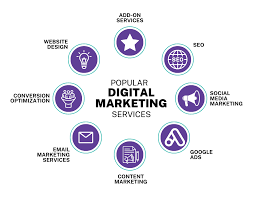The Power of SEM Campaigns in Driving Online Success
Search Engine Marketing (SEM) campaigns have become a vital component of any successful online marketing strategy. By leveraging the power of search engines like Google, businesses can reach their target audience effectively and drive valuable traffic to their websites.
SEM involves running paid advertisements on search engine results pages (SERPs) to increase visibility and attract potential customers. These ads are displayed prominently at the top of search results, making them highly visible to users actively looking for products or services related to your business.
One of the key benefits of SEM campaigns is their ability to target specific keywords that are relevant to your business. By bidding on these keywords, you can ensure that your ads are shown to users who are likely to be interested in what you have to offer. This targeted approach not only increases the likelihood of attracting qualified leads but also maximizes the return on your advertising investment.
Additionally, SEM campaigns provide valuable insights into user behavior and preferences. By analyzing metrics such as click-through rates, conversion rates, and cost per acquisition, you can gain a deeper understanding of your target audience and optimize your campaigns for better results.
Another advantage of SEM campaigns is their flexibility and scalability. You have full control over your ad budget, allowing you to adjust spending levels based on performance and business goals. Whether you’re looking to drive immediate sales or build brand awareness, SEM offers a range of options to suit your objectives.
In conclusion, SEM campaigns play a crucial role in driving online success by increasing visibility, attracting targeted traffic, and providing valuable insights for optimization. By incorporating SEM into your marketing strategy, you can stay ahead of the competition and achieve meaningful results for your business.
Top 5 Frequently Asked Questions About SEM Campaigns Answered
- What is SEM and how does it differ from SEO?
- How do SEM campaigns work?
- What are the benefits of running SEM campaigns?
- How can I measure the success of my SEM campaign?
- What are some best practices for optimizing SEM campaigns?
What is SEM and how does it differ from SEO?
Search Engine Marketing (SEM) is a digital marketing strategy that involves running paid advertisements on search engine results pages (SERPs) to increase visibility and attract targeted traffic to a website. SEM allows businesses to bid on specific keywords related to their products or services, ensuring that their ads are displayed prominently to users searching for relevant terms. In contrast, Search Engine Optimization (SEO) focuses on optimizing a website’s content, structure, and technical aspects to improve its organic visibility in search engine results. While SEM provides immediate visibility through paid ads, SEO aims for long-term sustainable growth by enhancing a website’s organic ranking. Ultimately, SEM and SEO work together to enhance a business’s online presence and drive valuable traffic from search engines.
How do SEM campaigns work?
SEM campaigns work by allowing businesses to create and run paid advertisements on search engine results pages (SERPs) to increase visibility and attract targeted traffic. These ads are triggered by specific keywords that users enter into search engines, ensuring that they are displayed to individuals actively seeking products or services related to the business. By bidding on relevant keywords and optimizing ad content, businesses can effectively reach their target audience and drive valuable traffic to their websites. SEM campaigns also provide valuable insights into user behavior and preferences, allowing businesses to refine their strategies for better results and maximize the return on their advertising investment.
What are the benefits of running SEM campaigns?
Running SEM campaigns offers a multitude of benefits for businesses looking to enhance their online presence and drive targeted traffic to their websites. One key advantage is the ability to target specific keywords relevant to your business, ensuring that your ads reach users actively searching for products or services you offer. SEM campaigns also provide valuable insights into user behavior and preferences through metrics analysis, enabling businesses to optimize their strategies for better results. Additionally, the flexibility and scalability of SEM allow businesses to adjust ad budgets based on performance and goals, making it a versatile tool for achieving marketing objectives effectively.
How can I measure the success of my SEM campaign?
Measuring the success of your SEM campaign is essential to understanding its impact and optimizing performance. One of the key metrics to track is the click-through rate (CTR), which indicates the percentage of users who clicked on your ad after seeing it. Additionally, monitoring conversion rates, which measure the percentage of users who completed a desired action, such as making a purchase or filling out a form, can provide valuable insights into campaign effectiveness. Other important metrics to consider include cost per click (CPC), return on investment (ROI), and overall revenue generated from the campaign. By analyzing these metrics regularly and making data-driven decisions, you can gauge the success of your SEM campaign and make adjustments to improve results over time.
What are some best practices for optimizing SEM campaigns?
When it comes to optimizing SEM campaigns, there are several best practices that can help maximize the effectiveness of your efforts. One key practice is conducting thorough keyword research to identify relevant and high-performing keywords to target in your ads. Additionally, creating compelling ad copy that is clear, concise, and relevant to the user’s search intent can improve click-through rates and conversions. Regularly monitoring and analyzing campaign performance metrics, such as click-through rates, conversion rates, and return on ad spend (ROAS), is essential for identifying areas of improvement and making data-driven optimizations. Furthermore, testing different ad variations, targeting options, and bidding strategies can help fine-tune your campaigns for optimal results. By implementing these best practices consistently, businesses can enhance the performance of their SEM campaigns and achieve greater success in reaching their target audience.






